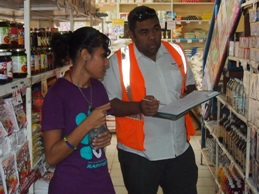Monitoring & Surveillance
Market Access component is being handled by the Monitoring and Surveillance Section while The Technical Facilitation component is being handled by the Export Section that is present in all the BAF stations around the country.
Objectives
Given the potential impacts of a serious biosecurity incursion, it’s easy to see why biosecurity is critical for Fiji. A lot of effort is put in behind the scenes to ensure that biosecurity risks are reduced, managed or eliminated long before, and in some cases after unwanted pests and diseases reach our shores.
Description
Our obligation under the World Trading Organization requirement to standards such as the OIE, IPPC, Codex, Food Bio-safety, SPS and our Bilateral Biosecurity Agreements with Regional and other trading countries under which we are required to monitor our pests and diseases status through the surveillance system and providing feedback mechanism on possible pest or disease outbreak.The border inspection does not eliminate the risks but reduces it. The chances of pests’ infiltration because of lack of physical, financial and human resources are major constraints that weaken National Security.
The cost of monitoring and surveillance is significantly lower compared to the cost of eradication/control if there is a disease outbreak. It provides an early warning system to Fiji and its trading countries and the necessary action to be under taken.
The program consists of 3 major activities;
1.Pre-Border Operation
This involves offshore (overseas) inspection, risk assessment and audit of certain commodities. The increase in volume of imported second hand vehicle and machinery, bulk grain (rice & wheat), plants/animals and their products, and auditing of BQA pathway in trading countries demands our active participation in this activity.
2.Border Operation
This involves risk assessment of incoming vessel/aircrafts, cargoes, mails and travelling passengers. These activities encompasses, boarding, screening, inspection, profiling and supervision of all international arrivals of vessels, aircrafts, commercial cargoes(perishable cargo), packaging, parcel post, personal luggage, and importation /transit of live animals and
Risk management is a vital component in addressing high risk elements through fumigation, incineration, confiscation, re export, certification or other Biosecurity approved measures. An animal ERP to protect Fiji’s Biodiversity and its Agro-based Industry has been developed. Work on a Plant ERP has progressed.
3.Post Border Operation
This involves field assessment of new pests/disease outbreak, supermarket/warehouse surveillance, auditing of Biosecurity approved premises and treatment facilities, testing, sampling and carrying out diagnostic activities
Management of termite eradication programme is on-going however complete eradication is not possible
The state of termite infestation is minimum, and currently operations are on going in monitoring and containing the infestation in Lautoka and Labasa.
Given the potential impacts of a serious biosecurity incursion, it’s easy to see why biosecurity is critical for Fiji. A lot of effort is put in behind the scenes to ensure that biosecurity risks are reduced, managed or eliminated long before, and in some cases after unwanted pests and diseases reach our shores.
Biosecurity monitoring and surveillance is not an end to itself; it achieves multiple outcomes, such as:
- increased trade and market access for Fiji’s products;
- maintaining and enhancing economic opportunities, growth and prosperity;
- protection and enhancement of our natural and historic heritage, the integrity of ecosystems and the character of Fiji landscapes;
- healthy and rewarding lifestyles, freedom and respect for cultural expression, and enjoyment of the recreational value of the natural environment;
Based on economic and agricultural resources the Biosecurity system of any country must be considered in a global context. It is more than just border protection and it is bigger than just one government agency.

Biosecurity Officer at their routine shop surveillance
System of Biosecurity activities:
- Offshore – reducing the risks posed by other countries through activities such as developing Standards and Regulations and Pest Risk Analysis.
- At our Borders – stopping biosecurity-risk pests and diseases getting into Fiji Islands
- Within our Borders – eradicating, managing, and containing those pests and diseases that have established.
Global – rest of the world, outside Fiji’s borders, where biosecurity risks emerge, and information on intelligence and surveillance is gathered and exchanged. This is where international treaties and multi-lateral agreements are negotiated and where responsibility for facilitating trade access and for Fiji’s reputation lies.
Pathways and Borders – the mode in which biosecurity-risk goods and organisms arrive and enter Fiji, the final point at which people, goods and craft are given approval to enter into or depart from Fiji, including all the activity to manage risk prior to, or at the border. This includes export trade inspection and official assurances, and certification.
Within Fiji – the management of risks and impacts of pests and diseases that have crossed the border and diseases that have already established in Fiji. The effective national Biosecurity management, together with animal welfare management enables the assurance of Fiji as an exporter that is free of biosecurity-risk goods.
Pest and Disease Risk Management
Management of the risk of entry of exotic pests and diseases to give effect to Fiji’s appropriate level of protection through appropriate Biosecurity controls at Fiji’s border, and managing the impact of major pest and disease incursions on Fiji’s agricultural, human health ,environment and forestry industries through effective border and post-border control arrangements
Key performance
- Key processes contributing to and increasing, national animal and plant health arrangements have progressed.
- Biosecurity programs contribute to national preparedness for pest, disease and contaminant for emergency incidents. Implementation of a rapid response plan to pest, disease and contaminant emergencies.
- Enhancement of regional networks providing early warning of new sanitary and phyto-sanitary (SPS) threats to Fiji with increased capacity to mitigate threats off shore.
- Fiji Biosecurity border interventions reduce the risk of entry of exotic pests and diseases.
The market access team conducts its function in the following areas:
- Central Division
- Lomaiviti Group
- Kadavu
- Beqa
- Lau Group
